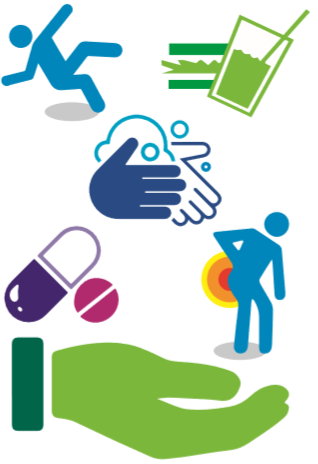 10 top tips to staying safe
10 top tips to staying safe
1. Preventing falls
If you need assistance, just ask.
Is your footwear correct? Wear sturdy, well-fitting shoes or slippers with rubber soles to help grip.
Use your usual walking aids.
2. Preventing blood clots
If advised, wear hospital stockings and move as often as you can.
Try and do simple leg and ankle exercises to encourage blood flow.
Drink fluids as recommended.
Take blood-thinning tablets or injections as advised.
3. Food and drink
Make sure you eat and drink plenty as this will help you recover more quickly.
If there is nothing on the menu that you like, ask for alternatives.
It is ok for your family to bring in food and drinks that you like, however, we cannot cook or re-heat food.
4. Preventing infection
Wash your hands before and after visiting the toilet and also before eating.
Don’t hesitate to ask our staff if they have washed their hands.
Tell us if you have diarrhoea or vomiting.
5. Your medication
Tell us if you have an allergy to any medication.
If you don’t understand what a medicine is for, just ask.
Talk to any doctor, nurse or pharmacist about any concerns you may have.
6. Pressure ulcers
If possible keep mobile, even in bed, and let us know if you are uncomfortable.
We are happy to help you change position in or out of bed and can provide a special mattress or cushion if needed.
7. Identification
You will be asked to tell us your name and date of birth to ensure we give you the right treatments and medications.
Tell us if any of your personal information is wrong or has changed so we can ensure our records are accurate.
8. Your care
We want to make sure you understand what is happening with your care and treatment – please tell us how you feel.
9. Any concerns?
We are here to help – please talk to us if you have any worries or concerns about your treatment or what will happen when you leave hospital.
10. Leaving hospital
Before you leave, please make sure you:
• Have been given your discharge letter
• Have your medicines and that they have been explained to you
• Know who to contact if you have any questions/concerns
• Know if you need another appointment and when it is

